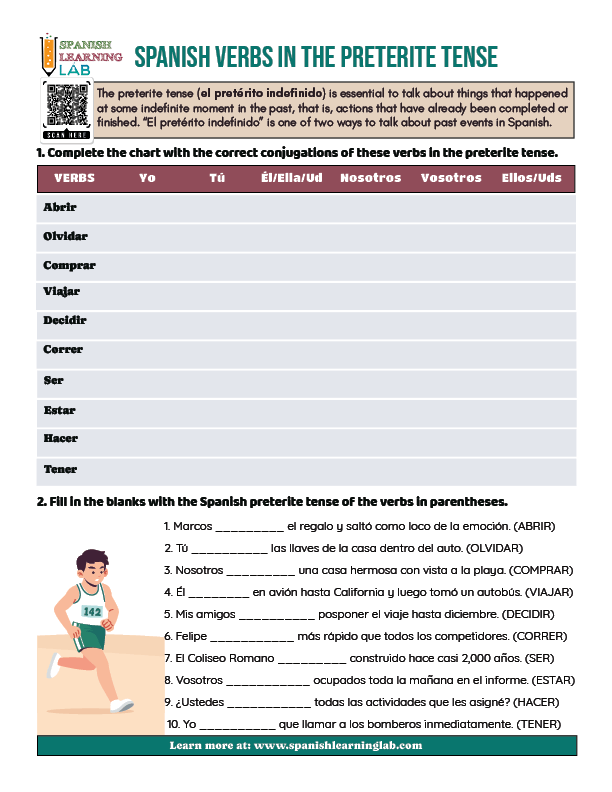¡Hola! Thanks for joining us again. This PDF worksheet was designed to help you practice the conjugation rules for the preterite tense in Spanish (el pretérito indefinido). These two exercises include both regular and irregular verbs in this tense, and will definitely help you test your knowledge on this topic.
Directions:
Students could work individually or in pairs to solve the exercises on this worksheet.
As it is explained on top of this worksheet, the preterite tense (el pretérito indefinido) is essential to talk about things that happened at some indefinite moment in the past, that is, actions that have already been completed or finished, e.g. “Yo desayuné”. (I ate breakfast). Keep in mind that “el pretérito indefinido” is one of two ways to talk about past events in Spanish, the other one being the imperfect past tense (el pretérito imperfecto).
To solve the first exercise, students must complete the chart on the worksheet containing a list of 10 common verbs using the right conjugations for these verbs in the preterite tense in Spanish. Some of them are regular, whereas others are irregular, so we suggest they use a conjugation tool to double-check the right form of the verbs for each subject pronoun under the “Pretérito indefinido” column. As for the second exercise, students must fill in the blanks using the correct conjugations of the verbs in parentheses, making sure the sentences make grammatical sense in Spanish.
Worksheet information:
Level: Beginners
Skill: Grammar
Related lessons:
- Regular and Irregular Verbs in the Past Tense in Spanish
- The Imperfect Past Tense in Spanish: Rules and Audio Examples
- Talking about Last Weekend in Spanish

Extra in-class activity:
Students work in groups of four on a role-play activity. Each group must choose a historical figure they admire and find four interesting things they did when they were alive. These sentences must be written in the preterite tense in Spanish first, and once students have chosen the most important information to share, they should present as if they were this person they chose, for instance:
- ¡Hola! Soy Alexander Fleming. Nací en Escocia en 1881. (Hello! I’m Alexander Fleming. I was born in Scotland in 1881.)
- Yo fui un científico importante. Inventé la Penicilina… (I was an important scientist. I invented Penicillin)
